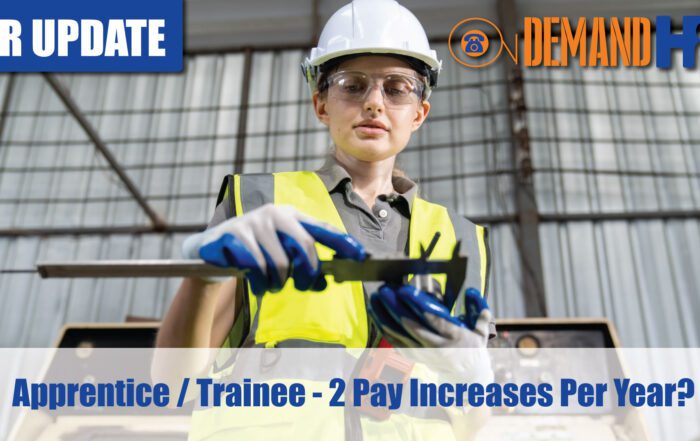CPA Australia Panel Discussion (Workplace Relations) May 2021
On Demand HR was asked to joing a panel before a CPA Australia workshop and share our thoughts on a veriety of topics in the HR, Workplace Relations and recruitment space.
Please see below for a full transcript of the video.
Share the HR or workplace relations challenge facing your business and one of our experienced consultants will be in touch within 24 hours with a strategic action plan or discover the best strategy yourself by accessing out free online training library.
Transcript
0:07
Thanks so much, Gavin. And thanks for the introductions, just to get the ball rolling. Obviously, Gavin’s just touched based on what we’ll be covering today. So I thought we’ll do a bit of an icebreaker with our guests today. And just ask them an icebreaking question about themselves in their practice and what they’ve experienced in the COVID period. So we’ll start with you, Clint. So you specialize in human resources. So tell us a little bit about your business and your experience over the last 12 months?
0:33
Yeah, look, certainly the last 12 months has been busier than it has ever been. And we’ve seen challenges for clients in a whole range of things. And look, ultimately, our organization On Demand HR was founded on three key things. It was founded on providing small and medium businesses with industrial relations advice, and really servicing this gap in the market between HR consultants that don’t know IR and the legal profession that obviously can be charging at times excessively, fees for these sorts of advice. So that’s the first area of our expertise, the second are of expertise is in the recruitment services and providing campaigning to business. And the third being in and around compliance, employment compliance with respect to awards, employment, contracts, policies, and those sorts of things. So what we’ve seen in the last 12 months is, is all of those things, we’ve seen major changes in the Modern Award system in 2020, we’ve seen recent changes in casual employment, we’ve seen a number of changes with respect to COVID-19, how that impacts on workers comp, how that’s impacted on stand downs, job keeper enabled directions under the Fair Work Act. So it’s been an extremely busy 12 months, and one that has changed quite rapidly, even from literally a few months ago to where we are right now.
1:44
Yeah, yeah. And so obviously, during the pandemic, and at the beginning of it, there was obviously a lot of hurdles that employees did have to actually overcome, especially as we were moving from the team environment, working together collaboratively in the office space, and then going remotely. And obviously, a lot of employees were having some issues. So I guess this would be a really good area for Clint to have a bit of say, into what what have you sort of experienced with your your clients?
2:14
I think that the, the incorrect assumption is that everyone will work from home and do a fantastic job of doing it. And you read a lot of the literature around this. And the assumption is that if everyone works from home, how great that is, and how productive everyone’s going to be. But the reality is that, I think that it probably splits about 50/50, I think 50% of people work very well in that environment, they’re self motivated, and they can deliver probably possibly even better results than they would from an from an office or a set environment. But the other 50%, I think, touching on some of the things that Justin just said, the lack of perhaps supervision or the lack of day to day direction, and guidance on those decisions, if you like, can put them in a situation where they’re actually less productive, simply because they don’t have that kind of habit and routine of the supervision and what goes with that. So I think the automatic assumption that it works is one that is questionable, and I think that that requires employers to take a slightly different look at this and really focus on results of their employees, rather than necessarily the working hours. The reality is, you’re not going to be able to know exactly what kind of working hours your employees are performing from home. So I think the emphasis needs to go on more results. And and trying to maintain, you know, a culture within that. I mean, having cultural there is cultural challenges with working from home as well, it’s, it’s, it’s always you’d have to say on a whole more difficult to maintain that culture when it’s that little bit more disconnected. So I think there’s a number of strategies employers can look at with respect to those things. Probably not enough time in today’s session to go through all of those things. But certainly, those are some of the challenges we’ve seen around that working from home peice.
Can you tell me, it’s on? Can you tell me how I’ve got to pay these people? Can you tell me what award they fall under? Can you tell me under what circumstances I can get rid of them? All of those kinds of questions more and I see Justin smiling there, because he’s probably got the same sort of questions. We were the fountain of all knowledge. And we’re supposed to know this stuff that we’ll never ever designed to be practicing as accountants. So how can you help us out there?
Two things. Two things I would say on that. So the first thing I would say is that I think that COVID has created an environment where employers are less likely to carry poor performing employees. So I think that a more of an emphasis has been put on getting rid of the Deadwood, so to speak, then it probably was before. I think that, you know, obviously economically there’s been challenges for a variety of number of businesses. And with that, you know, intent to not carry those poor performing employees. That’s led to a lot more discussions around you know, terminations exiting of employees, whether that’s through restructuring or redundancy processes, or whether that’s through performance based termination processes. So that’s the first thing I would say to the probably the second part of your question. In terms of the first part of your question. Combined with what we’ve seen with COVID, in the last year, the Fair Work Ombudsman and the Fair Work Commission thought it would be a great time to throw a whole bunch of new compliance obligations at businesses in respect to the modern awards. So in the last 12 months, we’ve seen, now Annualized Salary obligations for about 22 of the 130 modern awards, we’ve seen some awards that now require you to have mandatory classification. So advising your employees of what classifications they are upon commencement of employment, we still have very restrictive part time employment provisions in most, if not all of the modern awards that we have. And we have a lot of clients that, quite frankly, unless they’ve done a proper, what we would call internally a workplace relations review, they really have no idea about what modern awards cover their business. And that triggers a whole bunch of other obligations and consequences. And the common thing we hear in response to that is “oh well we had an employment lawyer look at our contracts five years ago”. So you know, we don’t have to do anything. But I think there’s a lack of realization about their true circumstances and some of those obligations. So the I guess the short answer, to your question is that there is challenges in both of those areas. And we’ve certainly tried to design services and service offerings around those things. In particular, in the last six months to kind of meet what we’ve seen has been a shift in that regard. Most definitely.
6:31
Going back to Clint, so obviously, employment has been a really big challenge that a lot of us have had to overcome in the last, the COVID period, really, So have you seen that there’s been a bit of a change with hiring? so are people are more likely to hire casual staff or part time staff? Has there been any sort of trend there that you can see?
6:54
I think the recruitment market is probably even for most people in the room is probably not what you would expect. I think a lot of people still have the mentality that there are people lining up on the sidewalks in the 1000s, waiting for any kind employer, that would be nice enough to give them a job. But what we’ve really seen in the unemployment rate is, yes, there was a rise at the initial stages. But we’ve seen that rate go up and come crashing down very, very quickly. To the extent that right now, if you look at the labor market statistics, we have record job seekers, record job vacancies, should I say on all the major platforms in just about every industry that you can imagine. So what that is, is more job vacancies, people, not enough people to fill those roles. And I think that actually works the opposite of looking at more casual or part time employment. And we’re just saying to employers right now that look, if you don’t have, you know, a full time offering, that’s a really good offering in the marketplace, then you’re almost wasting your time going to the market at all, unless it’s one of those specific circumstances that suits casual employment. So it works in with study or something like that, or it works in with someone who wants that type of employment. But if you’re in the market for full time employment, right now, there’s a pretty good chance you’ll be able to get it and there’s a pretty good chance you’ll be able to get more than one option at your feet.
8:16
And have you seen any sort of underlining theme, especially in the accounting industry, obviously, where we’re, we’re needing to recruit and retain staff at this point, because we’re so overloaded at the moment with everything that’s been going on and with the pandemic and how we’ve been rolling out all the ATO incentives, etc. So have you found, is there a new way that we should be looking to recruit staff in the accounting industry, or?
8:42
We, we’ve worked with a lot of accounting practices. And what I would say in the last 12 months is this hasn’t been very many redundancies at all. So I would say that that’s telling me that most accounting practices are still carrying the numbers that they were carrying before, if not more, I think that we talk a lot about this cycle of failure in recruitment, we see a lot of organizations try and do it internally. But they ultimately fail because they don’t, don’t sell the benefits well enough. They’re not responsive enough that that’s the biggest one, that they think they can place and ad and seven days later, sit on the hammock on a Sunday, and flick through some resumes and get back to those people when they please. The market is so fast now and and then and then the sort of mentality is okay, I’ve got to go out and get a recruitment agent. And then recruitment agents really only placing someone one of three ways. They’re got someone on a list that’s been sitting on a list for months. They take someone from a client, steal someone from a client and give him to another client, or they run a bunch of private ads on some boards that don’t sell the benefits to the organization at all. So we talk about this cycle of failure, what we’ve tried to do to help with businesses in that is create a hybrid model where we’ve had company branded campaigns, but managed externally for responsiveness reasons and for, you know, writing and selling benefits of these roles better.
My name is Brock. I thank you for the opportunity panelists. My question is, over the last 18 months, there’s been such a diverse change in in the environment and employment. Has there been? mostly for Clint Is there been a spike in depression and anxiety? And people are medication? And is there any allowance for those people when they’re looking for a job?
It’s interesting, I was looking at the statistics of this recently, and what my team has noticed is that there has been, I would say, more psychological claims. In the last, let’s say, 16 months, then perhaps there was before, but I think that’s a product of a couple of things, possibly a product of, you know, working remotely and those sorts of things. But I think it’s, it’s also a product of the very, very weak and very poorly administered workers compensation system we’ve got a New South Wales. For SMEs, you’ve got, you know, Icare, and you’ve got one basically claims manager. And you’ve almost got this kind of monopoly arrogance where, you know, for employers, they’re not getting results. And the average mental health claim at the moment in terms of lost time is about 21 weeks. So think about that when you receive a worker’s compensation certificate for, let’s say, stress or work related based stress, the average amount of time that a person will have off after that is about 21 weeks, that’s a big cost, first of all, and certainly something we’ve seen more on, but I would say it’s for a couple of reasons. It’s Yes, it could be connected to that remote work. But I think it’s also connected to the system and just the poor way that it’s running in New South Wales. And we were pulling our hair out on a daily basis with clients on these sort of issues, and the sort of results that we see in the way those things are carrying out and we’re just trying to fight those outcomes as best as we possibly can where it’s appropriate.
My question was more for, someone goes for for a job as a physician, and they’re disclosing that they’re on medication because they, they’re either depressed or had anxiety, is there an allowance for them? or no too hard basket you stay on, I’ll get somebody that’s not on any medication. Because what I’ve heard, there’s a lot of people out there on medication for depression and anxiety, and they haven’t had the opportunity to get a job.
I think if there’s fitness for work, I think that the product of the low unemployment environment, I think forces employers to take on basic and consider all options. And look most employers these days do have employee assistance programs. So if those people come to that prospective job, and if those people are hired for that prospective job, and if they perhaps slip back into depression or anxiety or things like that there are support measures available, I think that most employers are now conscious of to assist with those sorts of things. So no, I think to take you’re kind of at the heart of that, at that question. I think that employers are very much open to obviously working with people that have potentially had those struggles in the past, whether those whether those things come out in the pre employment screening depends on the employers processes, whether they’re doing pre employment medicals, those sorts of things. A lot of the time, those sort of things just aren’t spoken about in the pre employment discussion. So I guess it’s about the candidate how much they want to say. And it’s also about the employer how much they want to investigate or assess that prior to commencement.
13:23
Question for all the panel, I guess, given we are a service industry that focuses on advisory. How do you think this future ready practice that’s all digital is going to impact the future generations not having the ability to have the watercooler discussions and learn from listening to other people on the phone? Or how to deal with clients?
13:48
In general, I think employment, or should I say, even client relationships? I think, overall relationships in general, in a workplace, I think it just in decline. I don’t necessarily see that as a COVID thing. I think it’s probably a technology thing. I think people are just so much more comfortable these days to send an email when it’s more appropriate to be in the conversation. So I think that’s been, you know, reliance on devices, reliance on various different other forms of technology. And yes, obviously, there’s a whole bunch of upsides, which, obviously, Rebecca and Justin spoken about today. But I think that we’ve seen that for the average person that that is required to maintain relationships in their roles, they’re probably not doing it as well, because in broad terms, because social skills have probably been in a little bit of decline along with that. So that’s been my observation, particularly in sales, we see that those roles in particular in 2021, are very, very difficult to fill much harder than they were five years ago or 10 years ago. And I think that’s sort of symptomatic of that decline in social skills and behaviors so to speak.
And so Clint, have you seen much going on in that space with your clients, rather than having a full time or casual part time employee in their office, are they starting to outsource? A couple things I’ve seen on the in the outsourcing piece with accounting firms, we work with, two things, I would say the first thing is that I think we’ve seen a few roles in the last 12 months, kind of haven’t been for those firms that already are outsourcing. They haven’t been replacing those roles. And they’ve looked to push more to the outsourcing function that they’ve already established. And that’s the first thing I’ve seen, I think the second thing I’ve seen is that there’s probably less and less of this compliance only accountant, I think that there’s probably a lot more now have an emphasis on whether you’re going to be Australian based and offering, you know, working in that accounting field that you that you are in that business advisory and adding those sorts of services because I think accountants are now looking at this going well, well, can we get this stuff done, this compliance based work done offshore, obviously, there’s still a lot of time to go on that journey. But they’re probably the two things I’ve seen in the last, you know, 12 to 15 months.
16:04
On the next generation topic and putting outsourcing aside, considering uni graduates, as the uptake from them is slow, because the university is not putting accounting degrees on as much. And also the pandemic stopping international students coming into the country. Where do you see that next generation coming from?
16:31
I think that’s a great point. Justin made about the shift in labor as well, I think there has been some more for lack of a better word, you know, sexier occupations that have come out of this pandemic. And I think that some industries have treated people better than others. I think, you know, largely, I think accounting has been very, very stable. While I’ve seen some other industries where, you know, perhaps those people were very quick to be put on scrap heap as soon as those businesses hit trouble, but they’re not coming back to those businesses. And I think, where maybe employers have been a little lazy. And where I can relate it back to your question is that, I think it depends on where the pickup point is. So I think that more and more accountants and accounting practices and various other professionals are going to have to be content with not necessarily having someone that’s ready made. For the for the role they would like to have, I think they need to be more prepared now to look at, okay, do we get on university job boards do we start bringing people in at sort of second third year, working towards maybe a year, and then looking at full time offering of employment at the end of that year or year and a half of working through the university degree, obviously, that comes with limitations on what sort of work they’re going to be able to do. But those are some of the things that we’ve done, for example, at On Demand HR, we brought in students at the lower level, second thir year. So by the time they get to that end of the degree, we can then offer full time employment to those people. So I think that maybe a little bit mindset shift, will help trying to be prepared to take people on that aren’t necessarily ready made will be ready after a period of you know, training and instruction.
And then so just to sort of wrap up the session today. So where to tomorrow? what what can we implement in our practices today to future ready, our practices, when it comes to technology comes to new new services, service offerings that we have for our clients, and then also HR as well. Clint? I think in terms of look, at the HR piece, unfortunately, combined with this pandemic has been this sort of increase in compliance with the Commission, the Ombudsman, the things that have changed in modern awards, which is really disappointing actually, because ultimately, businesses are having enough challenges as it is, dealing with just the simple day to day economics of what they’re doing, to add to these sort of compliance increases as well, I think one thing that businesses are going to have to adapt to is that working from home is here to stay. And those that resist it will probably really struggle in their recruitment, campaigning in the future. So I think that if you’re not prepared to accept a level of working from home in your arrangements, then your competitors will, and your offer will ultimately be less attractive. So I know that that’s probably a lot of people feel very nervous about that. And they don’t want to make that shift. But that shift is going to be a necessity. So I think that’s probably the the main theme, I would say ahead is that there’s a massive squeeze on the talent. And that offering is going to have to adjust there is some compliance concerns. We’ve got around just the shifts we’ve seen in the last 12 months. So they’re probably the three main things we spoke about productivity before as well and keeping focused on results going forward. Rebecca touched on it also. So I think that’s probably the three or four things from an HR perspective to be really cognizant on in the in the time ahead.





